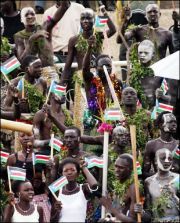Thousands dance with Sudan president in south
By Opheera McDoom
JUBA, Sudan, Jan 10 (Reuters) – Thousands of southern Sudanese danced with President Omar Hassan al-Bashir on Monday one day after a peace deal was signed to end more than two decades of civil war in the south.

|
|
Sudanese refugees celebrate in Nairobi after the signing of a peace accord between Khartoum and the southern rebels, Jan 9, 2005. (AFP). |
A crowd of about 10,000 southerners singing and waving their hands encircled Bashir as he danced to traditional southern music, dressed in a civilian brown suit and covered in a white cloak symbolising peace.
“I used to dress in khaki because I am in the army and because there was war,” Bashir told the crowd, which defied security and his armed guards and thrust forward, surrounding his platform.
“Today I am still in the army … but I’m not wearing khaki because there is no more war.”
Bashir flew to Juba from the Kenyan capital Nairobi, where his government signed an agreement on Sunday with the southern rebel Sudan People’s Liberation Army (SPLA) to end Africa’s longest civil war, which has claimed more than 2 million lives.
“Peace is the gift I bring to you,” he told the people who had come from all around Juba, southern Sudan’s main town.
People of all views were present, carrying banners that ranged from “One Nation, One People, One Aim” to “Yes to Separation, No to Unity.”
Under the deal, southern Sudanese have the right to hold a referendum on whether the south should secede, after an interim period of six and a half years.
Some were disappointed that an SPLA delegation was not present, after government officials had said the SPLA would join Bashir in the formerly government-controlled city of Juba.
CHEERS FOR GARANG
Every mention of SPLA leader John Garang’s name in the speeches by southern officials was met with huge cheers. “We will see them here soon. They are coming,” said Sarah David.
Bashir is due to go on to nearby Torit, which was SPLA territory, and then north to Malakal with his message of peace.
He told Jubans that peace would bring development.
“We will bring water. We will bring electricity … We will bring services,” he said. “And not just to Juba but all the cities … and not just all the cities but even to all the people in the countryside … and in the villages.”
Juba lacks mains electricity and runs on generators. Running water is also rare in the run-down town, which is the administrative capital of the south.
“We are going to make Juba the bride of the south, and not just the south but the bride of all of Africa,” Bashir said.
Aid agencies and the United Nations have planned huge budgets this year to rebuild the south, which has few tarmac roads and little if any infrastructure or medical facilities.
Bashir, an Islamist, chanted “God is Great” as well as “Hallelujah” to the mostly Christian crowd and jigged along to Christian songs.
Under the deal, Islamic Sharia law will be lifted from the mainly animist and Christian south. Khartoum will remain under Sharia, but joint committees will decide during the interim period how to safeguard the rights of the millions of non-Muslims who also live in the capital.
Garang told a rally of 10,000 people, mainly southerners, in Khartoum he would sign protocols with Uganda and Kenya to build railways between the south and its two neighbours.
Speaking over a telephone, he said the government would focus on rural development and education.
(Additional reporting by Khaled Abdel-Aziz in Khartoum)
